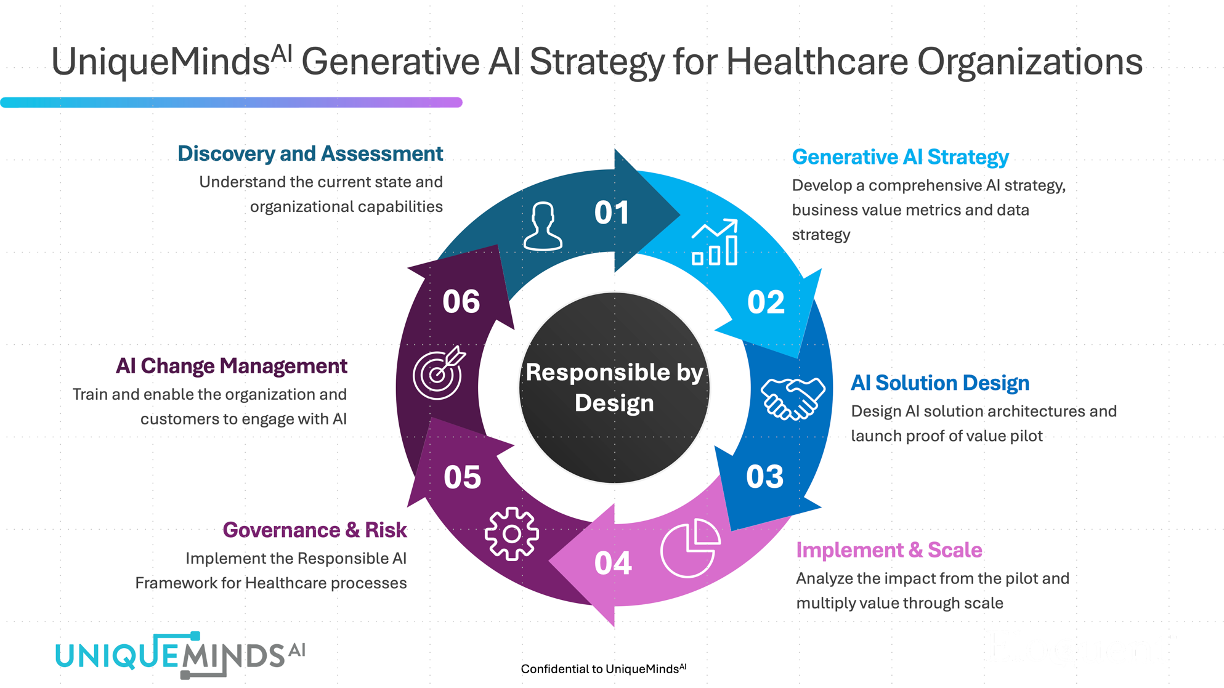Artificial Intelligence (AI) is revolutionizing the healthcare industry, offering unprecedented opportunities to enhance patient care, streamline operations, and advance medical research. AI applications transform healthcare providers’ operations from predictive analytics to personalized treatment plans. However, successfully integrating AI into healthcare systems requires thorough preparation and strategic planning.
The Vision for AI in Healthcare
The future of AI in healthcare is promising. AI has the potential not only to improve diagnostic accuracy and optimize resource allocation but also to significantly enhance patient outcomes. As we move forward, the goal is to create intelligent systems that assist healthcare professionals and empower patients with more control over their health. Healthcare organizations need to equip themselves with the right tools, strategies, and partners to harness the power of AI effectively and responsibly.
UniqueMindsAI is at the forefront of this transformation. To help healthcare organizations navigate the complexities of AI integration, UniqueMindsAI offers an AI Readiness Assessment at the end of the Discovery phase of engagement. This comprehensive document evaluates an organization’s current state and outlines a clear path toward successful AI development and deployment, ensuring that AI is responsible by design. Below, we detail the key components of an AI readiness assessment specific to AI integration in healthcare industry.
Components of the AI Readiness Assessment
The AI Readiness Assessment provided by UniqueMindsAI includes several critical areas essential for AI integration in healthcare:
- Understanding Data Requirements: Understanding the types of data needed for AI applications is crucial. The assessment evaluates the availability, quality, and comprehensiveness of existing data and identifies any gaps that need to be addressed. This involves:
- Data Inventory: Cataloging all available data sources, including structured (electronic health records, lab results) and unstructured (physician notes, medical imaging) data.
- Data Profiling: Analyzing data characteristics to understand its structure, content, and quality. This helps identify anomalies, inconsistencies, and missing values that need rectification.
- Data Integration: Ensuring seamless integration from multiple sources to provide a unified dataset. This involves resolving discrepancies in data formats and terminologies.
- Data Governance: Establishing policies and procedures for managing data quality, consistency, and accessibility. This includes defining data ownership, stewardship roles, and data lifecycle management practices.
- Privacy & Protected Health Information (PHI): Protecting sensitive patient information is paramount. The assessment examines current data protection measures and recommends enhancements to ensure compliance with regulations such as HIPAA and GDPR. This includes:
- Encryption: Implementing advanced encryption techniques for data at rest and in transit to prevent unauthorized access.
- Access Controls: Establishing robust authentication and authorization mechanisms to ensure that only authorized personnel can access sensitive data.
- Anonymization and De-identification: Applying techniques to anonymize or de-identify patient data, making it impossible to trace back to individuals while still retaining the utility of the data for analytical purposes.
- Data Masking: Masking sensitive data fields in non-production environments to protect data during development and testing activities.
- Audit Trails: Maintaining detailed logs of data access and modifications to monitor and review data usage and detect any unauthorized activities.
- Establishing Data Owners: Effective AI implementation requires collaboration across departments. The assessment identifies key data owners within the organization who can provide the necessary data and insights for AI projects. This involves:
- Stakeholder Mapping: Identifying and mapping stakeholders who have ownership or stewardship responsibilities over different data sources.
- Role Clarification: Clearly defining the roles and responsibilities of data owners and stewards, ensuring they understand their duties in data governance and AI implementation.
- Collaboration Frameworks: Establishing frameworks for collaboration and communication between data owners, IT, and AI teams to facilitate smooth data sharing and integration.
- Training and Awareness: Providing training to data owners on the importance of data quality, security, and governance in AI projects to foster a culture of data stewardship.
- LLM Selection: Choosing the right Large Language Model (LLM) is vital for the success of AI initiatives. The assessment reviews various LLM options, considering factors such as accuracy, scalability, and compatibility with the organization’s needs. This involves:
- Performance Evaluation: Comparing different LLMs based on performance metrics such as accuracy, precision, recall, and F1 score. Benchmarking models against relevant healthcare datasets ensures they meet specific use case requirements.
- Scalability Assessment: Assessing the ability of the LLM to scale with increasing data volumes and complexity. This includes evaluating computational requirements and cost implications.
- Compatibility Analysis: Ensuring the chosen LLM integrates seamlessly with existing IT infrastructure and workflows. Compatibility with current systems, data formats, and interoperability standards is crucial.
- Ethical Considerations: Evaluating LLMs for potential biases and ethical concerns. Ensuring that the models promote fairness, accountability, and transparency in AI-driven decisions.
- Vendor Assessment: Reviewing the reputation, support, and reliability of LLM vendors. Choosing a vendor with a proven track record in healthcare AI solutions can provide additional assurance of quality and support.
- Hosting Selection: Deciding where to host AI applications impacts performance and security. The assessment explores different hosting options, including on-premises, cloud-based, and hybrid solutions, to determine the best fit for the organization. Key considerations include:
- Performance Requirements: Evaluating the computational and storage requirements of AI applications to choose a hosting solution that offers adequate resources and scalability.
- Security Needs: Assessing the security features of different hosting environments, such as encryption, access controls, and compliance with industry standards. Ensuring the hosting provider offers robust security measures to protect sensitive data.
- Cost-Benefit Analysis: Comparing the costs associated with different hosting options, including infrastructure, maintenance, and operational expenses. Choosing a cost-effective solution without compromising on performance and security.
- Regulatory Compliance: Ensuring the chosen hosting environment complies with relevant regulations and standards. This includes verifying the provider’s compliance certifications and data residency requirements.
- Flexibility and Scalability: Selecting a hosting solution that offers flexibility and scalability to accommodate future growth and changes in AI application requirements.
- Security: Security is a critical component of deploying AI solutions in the health and life sciences industry. The assessment ensures that all AI implementations adhere to stringent security protocols to protect against cyber threats and data breaches. This includes:
- Multi-layered Security: Implementing multiple layers of security controls, such as firewalls, intrusion detection systems, and secure access management, to provide comprehensive protection against cyber threats.
- Incident Response Plans: Developing and regularly updating incident response plans to quickly and effectively respond to security breaches and minimize their impact.
- Policy Development: Establishing and enforcing security policies and procedures that align with regulatory requirements and best practices. This includes policies for data handling, access controls, and incident management.
- Training and Awareness Programs: Providing regular training to employees on security best practices and regulatory requirements. Raising awareness about the importance of data protection and compliance helps foster a security-conscious culture within the organization.
- Regulatory Compliance: Regulatory compliance involves adhering to industry standards and legal requirements, such as HIPAA, GDPR, and other relevant regulations. The assessment provides a comprehensive review of the organization’s compliance status, identifying any gaps and recommending corrective actions. Key activities include:
- Compliance Audits: Conducting regular audits to ensure ongoing compliance with industry regulations and standards. This includes reviewing data handling practices, security measures, and documentation to identify and address any compliance gaps.
- Documentation and Reporting: Ensuring all compliance-related activities are well-documented and reported. This includes maintaining records of data processing activities, consent management, and compliance training.
- Regulatory Updates: Keeping abreast of changes in relevant regulations and updating compliance measures accordingly. This includes subscribing to regulatory updates, participating in industry forums, and consulting with legal experts.
- Risk Management: Implementing risk management practices to identify, assess, and mitigate compliance risks. This includes conducting regular risk assessments and developing mitigation strategies to address potential compliance issues.
- Vendor Compliance: Ensuring that all third-party vendors and partners adhere to the same regulatory standards. This includes conducting due diligence, reviewing vendor compliance certifications, and establishing contractual obligations for data protection and compliance.
A Strategic Roadmap for AI Integration
The AI Readiness Assessment concludes with a detailed strategy to prepare the organization for AI development and deployment. This roadmap includes:
- Business Use Cases: product roadmap of prioritized use cases scored on business impact / value, technical feasibility and risk to health outcomes.
- Training and Education: Ensuring staff are knowledgeable about AI and its applications in healthcare is crucial. The assessment outlines training programs to build internal expertise.
- Infrastructure Development: Recommendations for upgrading or implementing IT and data infrastructure to support AI initiatives.
- Pilot Projects: Identifying suitable Proof of Value (PoV) pilot projects to test and refine AI applications before full-scale deployment and value scaling.
- Governance and Oversight: Establishing governance structures to oversee AI projects, ensuring they align with the organization’s goals and regulatory requirements.
- Continuous Improvement: Developing a framework for continuously monitoring and improving AI applications, ensuring they evolve with emerging technologies and changing healthcare needs.
UniqueMindsAI Generative AI Strategy
The strategic roadmap for AI integration is a key component of the broader Generative AI Strategy for healthcare organizations:

Healthcare organizations that follow a thoughtful strategy can differentiate themselves by offering superior patient experiences, innovative treatments, and more efficient operations; all enabled by the power of generative AI.
Empowering Healthcare Organizations
By providing a thorough AI Readiness Assessment and Strategy, UniqueMindsAI empowers healthcare organizations to make informed decisions about AI integration. This strategic approach ensures that healthcare providers are well-prepared to leverage AI’s potential, leading to better patient outcomes, enhanced operational efficiency, and a more resilient healthcare system.
At UniqueMindsAI, we believe in delivering AI that is responsible by design. As the healthcare industry continues to evolve, the guidance and expertise offered by UniqueMindsAI will be instrumental in shaping a future where AI is seamlessly integrated into healthcare delivery, benefiting providers and patients alike.
Ready to start or further develop your AI journey? Contact UniqueMindsAI today to get a trusted partner who can guide you through the process and help you harness the benefits of AI responsibly. Let’s work together to create a smarter, more efficient, and patient-centric healthcare system.







